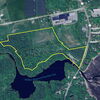Processing Your Payment
Please do not leave this page until complete. This can take a few moments.
- News
-
Editions
View Digital Editions
Biweekly Issues
- November 17,2025
- November 03, 2025
- October 20, 2025
- October 6, 2025
- September 22, 2025
- September 8, 2025
- + More
Special Editions
- Lists
- Viewpoints
-
Our Events
Event Info
Award Honorees
- Calendar
- Biz Marketplace
Working the numbers | Job creation emerges as a central campaign theme in the governor's race
It's the kind of event one assumes Baldacci hopes to attend frequently in coming months, as he heads into a November election in which the issue of job creation is expected to be front and center. "Everyone has the same poll results," says Christian Potholm, pollster and government professor at Bowdoin College in Brunswick. "Everyone knows it's the number-one issue."
But when it comes to Maine's job situation, there are, shall we say, differences of opinion.
One view has it that employment growth is flat, and Baldacci is largely to blame. Taxes here are still too high, the argument goes, state government is unfriendly to business and companies are investing instead in states like New Hampshire, which last year added 10,000 new jobs.
You'll hear that argument between now and November from whoever is running against Baldacci. Listen, for example, to candidate Peter Mills: "I don't think Maine voters are going to be able to point to anything this administration has done for job creation," says the Republican from Cornville.
Opinion two will come from Baldacci and his administration. It's likely to sound like this: Maine has gained 22,000 jobs in the last three years, a significant increase considering the tepid national economy. The state's business climate, while not perfect, has improved dramatically, and initiatives like Pine Tree Development Zones are bringing new employment to all corners of the state.
Which argument is closest to the truth may not be obvious, yet this much seems clear: Between now and November, the state's job situation will be thoroughly dissected. Numbers will clash. Statistics will be thrown. If a company in Maine cuts jobs this year, Baldacci's challengers will surely note it. And if an employer adds jobs, the governor likely will celebrate it with more events like the visit to Irving Tanning Co. "The governor is prepared to defend his record," says Jesse Connelly, campaign manager for Baldacci.
Spin cycle
Like all incumbents, Baldacci wants it known that there has been job development on his watch. But some voters may find campaign claims confusing. For example, Baldacci recently announced that new Department of Labor figures show "robust growth," noting employment in Maine had grown from 655,000 to 677,000 during the three years he's been in office. Yet nearly all the growth came during one year, 2004, and Republicans are happy to mention that employment last year was flat.
Connelly says debate over recent job growth is somewhat beside the point, because it will take a few years for the governor's reforms to have an impact. "I don't think this is an election about numbers," he says. "I think it's about the overall quality of the business climate that we have long-term."
Sometimes, even the same event can be spun to bolster both sides of the debate. Was Bank of America's recent decision to cut 345 former MBNA jobs in Farmington, Portland and Aroostook County good news or bad? To Baldacci opponents, it was unmistakably bad, and yet another symbol of a sagging economy and failing leadership. But the governor cheered the decision because it didn't include significant job cuts at the former MBNA facilities in Belfast, where about 1,700 people work. Baldacci said he was "very pleased" the bank had committed to staying in Maine.
Those words raised a few eyebrows. "That almost seemed like he was desperate to put a positive spin on bad news," says James Melcher, a political science professor at the University of Maine at Farmington. "It certainly wasn't good news in Farmington and Fort Kent."
But Melcher says he understands the impulse, because it's conventional wisdom in politics that bad economic news is political poison. And proving that a person's view of an event depends on where they're sitting, one of Baldacci's challengers admits he might have reacted the same way ˆ if he'd been in charge. "It's a matter of perspective," says Chandler Woodcock, a Farmington Republican. "If I was the governor, I'd hail it as good news, too. But the reality is we lost jobs."
Woodcock and other challengers say they fully intend to knock Baldacci on job creation as the campaign progresses. After all, they say, jobs are one of the key issues on which people base their voting decisions. "People are always afraid they're going to lose their jobs, and they're afraid they're going to die with their children working in Connecticut," says Mills. "It's a deep-seated anxiety, and that's why politicians play on it so much."
But Potholm believes a candidate placing great emphasis on job creation is making a mistake. The problem, Potholm says, is everyone agrees Maine needs more jobs. There are about a dozen people running for governor; nearly all will be hitting the same note. And it's not, in Potholm's opinion, an issue that will sway votes.
Moreover, Potholm says polling suggests Mainers have a deep economic pessimism and they no longer believe the state is in control of its economic destiny. "Everyone knows that Maine needs more jobs," Potholm says. "And everyone knows there's nothing the governor can do about it."
The candidates disagree, at least publicly. Each can quickly list ways they would boost job creation, if voters were only wise enough to provide them with the chance. Would Potholm advise Blaine House challengers to concede to voters that the state economy is beyond Augusta's control? Not exactly. "That happens to be the truth, but you can't say that," Potholm says. "They have to talk about jobs. It's just not going to change anybody's mind."
Mainebiz web partners

The Giving Guide
The Giving Guide helps nonprofits have the opportunity to showcase and differentiate their organizations so that businesses better understand how they can contribute to a nonprofit’s mission and work.
Learn More
Work for ME
Work for ME is a workforce development tool to help Maine’s employers target Maine’s emerging workforce. Work for ME highlights each industry, its impact on Maine’s economy, the jobs available to entry-level workers, the training and education needed to get a career started.
Learn More
Groundbreaking Maine
Whether you’re a developer, financer, architect, or industry enthusiast, Groundbreaking Maine is crafted to be your go-to source for valuable insights in Maine’s real estate and construction community.
Learn more-
The Giving Guide
The Giving Guide helps nonprofits have the opportunity to showcase and differentiate their organizations so that businesses better understand how they can contribute to a nonprofit’s mission and work.
-
Work for ME
Work for ME is a workforce development tool to help Maine’s employers target Maine’s emerging workforce. Work for ME highlights each industry, its impact on Maine’s economy, the jobs available to entry-level workers, the training and education needed to get a career started.
-
Groundbreaking Maine
Whether you’re a developer, financer, architect, or industry enthusiast, Groundbreaking Maine is crafted to be your go-to source for valuable insights in Maine’s real estate and construction community.
ABOUT
NEW ENGLAND BUSINESS MEDIA SITES
No articles left
Get access now
In order to use this feature, we need some information from you. You can also login or register for a free account.
By clicking submit you are agreeing to our cookie usage and Privacy Policy
Already have an account? Login
Already have an account? Login
Want to create an account? Register
Get access now
In order to use this feature, we need some information from you. You can also login or register for a free account.
By clicking submit you are agreeing to our cookie usage and Privacy Policy
Already have an account? Login
Already have an account? Login
Want to create an account? Register







Comments